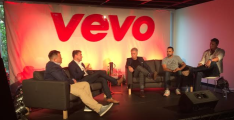Music streaming business model is set for ‘massive change’ warns Vevo boss
 The international boss of music video streaming service Vevo has told a forum that the global music streaming market is about to face a major shake up in the next two years.
The international boss of music video streaming service Vevo has told a forum that the global music streaming market is about to face a major shake up in the next two years.
Citing singer Taylor Swift’s decision to pull out of music service Spotify, Nic Jones, executive vice president international at Vevo, told a panel discussion hosted by Authentic Entertainment that many services were not paying artists/licensees enough and that many of the existing deals would not be renewed.
“There will be a massive change in the next two years, I promise you, you will see a massive, massive change,” said Jones. “There are a whole bunch of (licence) deals that are coming up for renewal and they will not be renewed.
“It will be very interesting to see what will happen.”
Jones was on a panel which also included Telstra Media’s head of sports and entertainment Ryan Kaveney, Group M’s investment director Danny Bass and Droga5 CEO Sudeep Gohil.
The Vevo international executive also noted how in Australia the market for live events far exceeded other countries as artists seek to make money through means other than traditional sales and streaming.
“Australia has the highest ticket price in the world. That’s why it is such a good live market – it is the fifth largest live market in the world and for a country of 20m people is ridiculous and that is because you are quite prepared to pay $150 to go see Katy Perry.
“The reason that you used to tour was to sell the CD or the album,” he commented. “The reason that has now reversed (appears to be) because you now make more money from live events.”
Droga5’s Gohil told the room that with the traditional music business model increasingly under pressure talent were forced to focus on live events and merchandising.
“The premium version of music is now the live experience,” said Gohil, CEO of creative agency Droga5. “All of the other stuff music that was paraded around the world of music – albums, singles, t-shirts is just stuff to sell their concerts — it is just marketing.”
Kaveney added: “The (existing) model of paying for content will continue to come under pressure,” he said. “And more artists will follow (Taylor Swift).”
Media buyer Danny Bass said the impact of changes in consumption habits were not just limited to consumer side but also to the way media way bought, telling the audience how at GroupM they had looked at expanding their broadband capacity due to the number of young media buyers using Spotify.
“If you think about the average age of a media buyer it is probably early 20s – at best 25,” said Bass. “This is the first generation that has never bought and will never buy a newspaper and will probably buy less magazines than ever before.
“We had an incident earlier this year where our head IT stood up and said we have a problem because we either need to ban Spotify or buy more cable because of the amount of use across the business is slowing the internet access across the business.
“If Spotify don’t want a bigger free kick than that, it is that. For all new businesses coming through these are the people who are engaging with your brand and engaging with content in a different way. So yes there might have been gates in the past but there is also an amazing opportunity to content with these media planner/buyers.”
Nic Christensen




Taylor Swift didn’t move her music from Spotify because she wasn’t getting paid enough, it was because Google’s identical service paid her more. It was a PR stunt.
http://www.smh.com.au/entertai.....1phki.html
User ID not verified.
Isn’t not being paid enough and somebody paying you more pretty much the same thing?
User ID not verified.
Hey Anonymous, you are clearly a Spotify troll. It is not just Taylor Swift who has exited Spotify or employed windowing strategies – numerous global artists have including; Tom Yorke, Adelle, and numerous others…Look there are streaming businesses that pay more per stream them Spotify (a lot more we are talking 8-10 x what Spotify pays). However even that is not viable for artists. Going further streaming is not viable for the streaming businesses themselves look at there costs – upfront advances paid through to labels to license there catalogue (which are not then paid through to the artists who’s catalogue the labels trade on), equity that Spotify had to give labels on top of those aforementioned advances (which totaled over $50 million USD just for Spotify to launch in the US) and then they have to paid rights holders labels again for each stream (then the labels pay peanuts form those already peanuts per stream rates through to artists). Google laughed when Spotify was trying to sell itself at a $10 billion valuation – for a business that has not yet turned a profit. For streaming to survive as a viable model over the long-term labels need to stop there triple dipping – no other industry in the world gets away with it (advances, equity and royalties per stream) so why should the music business?…Just a thought
User ID not verified.